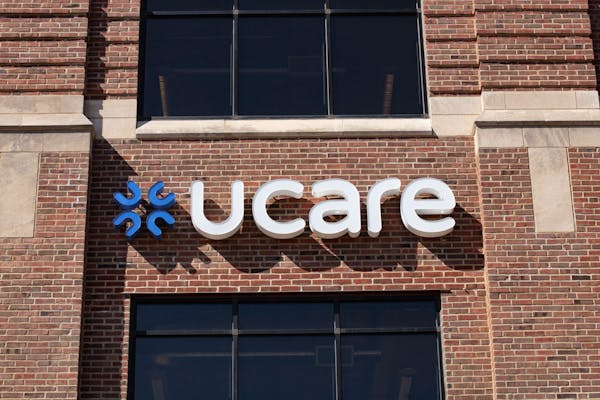UCare is putting the brakes on Medicare Advantage enrollment as part of a turnaround strategy that could include layoffs following unprecedented financial losses last year. The moves come despite a dramatic 20% growth in its Medicare health plan business that would be an unqualified success at other times.
In a filing with state regulators this week, UCare reported by far its worst annual financial results in 15 years of records reviewed by the Minnesota Star Tribune — a loss on operations of $504 million in 2024.
The operating loss helps explain why the Minneapolis-based health insurer sent messages to insurance agents in late March suspending commissions to brokers for new Medicare Advantage enrollments beginning July 1.
Those plans have seen higher-than-anticipated costs, so the move could help shore up UCare's finances by slowing red ink where premiums aren't covering expenses.
"Last year's financial results reflect continued challenges of rising medical and specialty medication costs, and higher use of services outpacing government payments," UCare chief executive Hilary Marden-Resnik said Wednesday in a statement. "We are implementing a multi-year strategic plan to ensure long-term stability for our members, providers and partners."
UCare employs more than 1,600 people in Minnesota.
"We have not yet determined if layoffs will be needed," UCare said in response to questions. "We have an extraordinary workforce and are working on plans that would allow us to avoid or minimize the need for layoffs. ... We're doing everything possible to avoid layoffs."
It's a remarkable dip for a health insurer that posted big profits just two years earlier before losing about $82 million on operations in 2023.
The operating loss of roughly half a billion dollars in 2024 comes as UCare's total financial reserves fell from nearly $1.1 billion at the end of 2023 to about $595 million at the end of last year.
"Some of the items detailed in our turnaround plan are already mitigating losses in 2025," a UCare spokesperson wrote in an email. "We will not exhaust our surplus, and we're confident we'll end the year with an improved outlook."
Over the past four months, UCare has seen its Medicare enrollment grow significantly following a turbulent open enrollment period last fall during which several health systems in Minnesota threatened to drop from the Medicare Advantage network at Minnetonka-based UnitedHealthcare and Kentucky-based Humana. UnitedHealthcare ultimately remained in-network.
A Star Tribune analysis of federal data shows big enrollment gains between December and March for nonprofit insurers UCare (+20%) and Blue Cross and Blue Shield of Minnesota (+9%), while membership declined at for-profit carriers Humana (-54%) and UnitedHealthcare (-8%).
Anticipating losses in 2025, UCare last year set aside $108.8 million in what's called a "premium deficiency reserve."
"There was unprecedented network disruption in the market this past year, which resulted in more growth than expected," Marden-Resnik said. "We are evaluating these plans on a real-time basis."
UCare is Minnesota's sixth-largest nonprofit group by revenue. It was created by family medicine doctors at the University of Minnesota in the 1980s to demonstrate whether an HMO could effectively and efficiently manage care for low-income patients covered by the state's Medicaid program.
Over the years, UCare started also selling Medicare Advantage plans, which are a privatized version of the federal health insurance program for seniors. UCare is also the largest provider of coverage via the state's MNsure health insurance exchange, where private insurers sell "Obamacare" health plans regulated and subsidized under the federal Affordable Care Act.
At the end of last year, about 587,000 people had coverage from UCare, including about 151,000 people in Medicare Advantage. By March, the Medicare Advantage tally had grown to about 182,000 people.
Tuesday's filing with insurance regulators shows UCare saw an operating loss of $315 million on its Medicaid health plans, which are privatized versions of the federal-state program for lower-income Americans and seniors, as well as $263 million on Medicare Advantage plans. In the MNsure market, the HMO lost about $21 million.
The Medicaid losses fit with a national problem for insurers where eligibility redeterminations in the wake of the COVID-19 pandemic have driven many from the program. Insurers say the departing enrollees have, on average, been healthier, creating a mismatch where government payments don't fully reflect the medical needs of the pool of remaining enrollees.
With Medicare Advantage, UCare says it experienced higher-than-expected utilization in certain popular health plans.
The message last month about suspended commissions sent a shock wave through the insurance agent community. Such cutoffs aren't unprecedented, but they're unusual since health insurers typically want to grow enrollment, and paying government-regulated commissions to agents can help.
"This decision was not made lightly and reflects our ongoing efforts to ensure the long-term financial health and sustainability of our organization," a UCare official said in the message to brokers, which was obtained by the Star Tribune.
Brokers appreciate that UCare gave advance notice about the July 1 commission suspension, said Joshua Haberman, who runs the Alexander & Haberman insurance agency based in Bloomington. He noted that the company is continuing to pay commissions for individual market coverage as well as a subset of Medicare enrollees who also qualify for Medicaid benefits.
But UCare's losses, he said, are alarming.
"To blow nearly half your reserves in one year and then to have tremendous growth on top of that, that's a bleak-looking hole," Haberman said.
In Tuesday's filing with state regulators, UCare said it has proactively developed a comprehensive multi-year financial improvement strategy that includes future Medicaid premium increases.
The strategy also includes Medicaid and Medicare enrollment initiatives "to ensure sustainable growth," UCare wrote in an email response to questions. In addition, UCare says it will push for administrative efficiency and "enhanced" strategies to manage the cost of medical claims.
The insurer also plans on redesigning products, service areas and benefit structures "to better align financial sustainability with member needs," UCare wrote in a statement.
In September 2023, UCare agreed to pay $100 million to settle a lawsuit from the University of Minnesota that accused the insurer of diminishing its influence by increasing the number of seats on the HMO's board of directors. The U agreed to relinquish its board majority at UCare, though the insurer still owes $25 million. UCare affirmed its commitment to paying the remainder by year's end.
More broadly, UCare expressed confidence borne of enduring past troubles, such as a 2015 episode in which the insurer had to cut more than 200 jobs after losing a state Medicaid contract that accounted for about half of its annual revenue.
"We have sufficient funds to pay claims, and we are confident in our turnaround strategy and plan," the insurer said. "UCare has weathered challenges in the past, including significant disruptions, and has demonstrated resilience throughout our 40+ years serving Minnesotans."
In 2024, UCare posted revenue of $6.26 billion, for a margin of about -8.1%, worse than the previous year's margin of -1.3%.
"Ultimately, UCare paid what it costs to cover care for Minnesotans," Marden-Resnik said.

To reset downtown Minneapolis skyway life, building owners cut deals with retailers

Ramstad: AI is English-centric, but it's picking up Hmong quickly
Don't throw away perks that come with insurance and memberships

Despite expense, long-term financial return on bachelor's degree still beats other options

